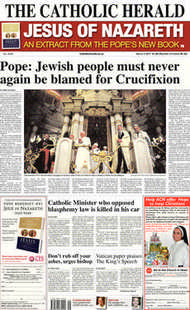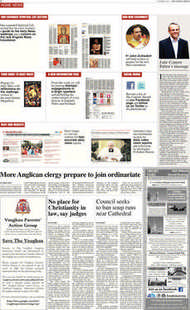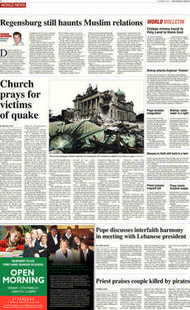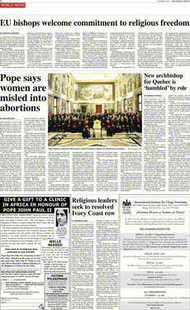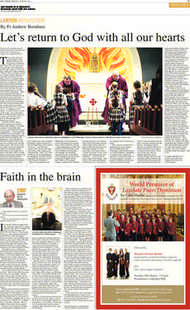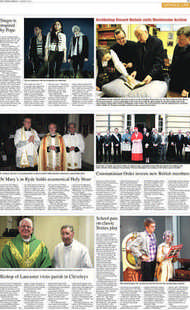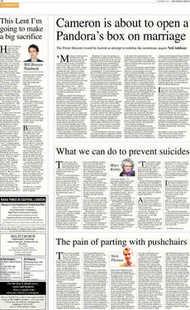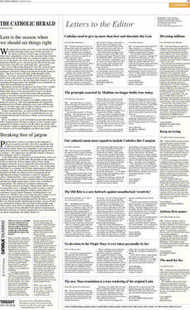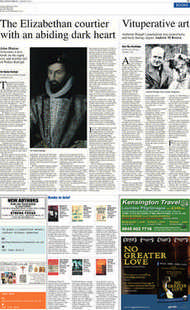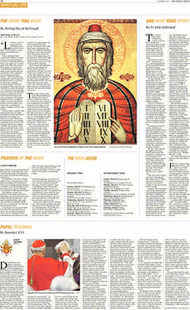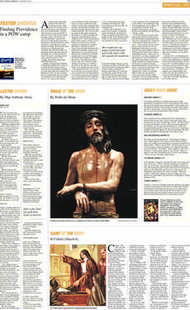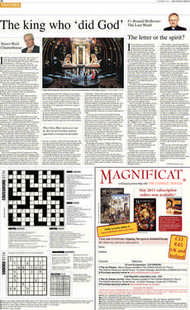Page 1, 4th March 2011
Page 1
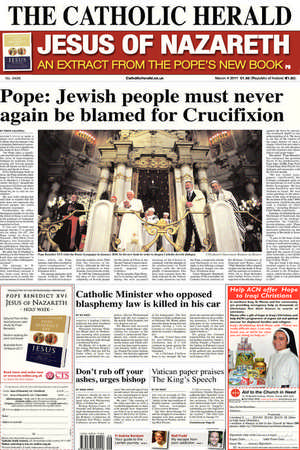
Report an error
Noticed an error on this page?If you've noticed an error in this article please click here to report it.
Tags
Share
Related articles
Pope Hails Unity Of German Orthodox
Benedict Praises Holiness Of Pius Xii
Pope Greets Jewish Leaders
Pope Benedict Defends Role Of Wartime Pontiff
Israeli Pm Thanks Pope For New Book
Pope: Jewish people must never again be blamed for Crucifixion
BY SIMON CALDWELL BENEDICT XVI is to make a major new contribution to Catholic-Jewish relations with a gripping theological assessment of who was culpable for the death of Jesus Christ.
The Pope takes a significant step forward in furthering the cause of inter-religious dialogue by explicitly exonerating the Jewish people from all blame for the Crucifixion and death of Jesus.
In his forthcoming book on Jesus, the Pope dedicates three pages to the famous passage in St Matthew’s Gospel in which “the Jews” demand the execution of Christ and shout to Pontius Pilate: “Let his blood be on us and on our children.” He uses both scholarship and faith to explain that the mob does not represent the Jewish people, but sinful humanity in general.
Furthermore, he offers theological insights to say that the blood of Jesus is not used in the purposes of vengeance but is poured out to reconcile mankind to God. It was not “poured out against anyone, it is poured out for many, for all”, the Pope writes in Jesus of azareth – Holy Week: From
ntrance into Jerusalem to the Resurrection, which will be published on Thursday by the Catholic Truth Society.
He adds that St Matthew’s reference to the blood of Our Lord does not represent “a curse, but rather redemption, salvation”.
The passage in St Matthew’s Gospel is particularly contentious because it has been used down the centuries to try to justify the anti-Semitism of some Chris tians, which, the Pope laments, had often resulted in “grave consequences”, an allusion to the persecution of European Jews.
The passage generates such strong feelings that Mel Gibson was forced to drop it from the subtitles of his 2004 film The Passion of the Christ, although he did not cut the comments in their Aramaic form from the script.
In 1965 the Vatican rejected the idea of the collective culpability of Jewish people for the death of Christ in the Second Vatican Council document Nostra Aetate, a move which angered some Catholics.
By his remarks Pope Benedict is re-stating and consolidating the now accepted teaching of the Church in continuity with the attempts of his predecessors to build bridges with the Jewish people. Commentators who have seen extracts from the book released by the Vatican this week, however, say that the Pope, a respected scholar and theologian in his own right, is also offering a unique theological insight into the New Testament texts.
Sister Margaret Shepherd, secretary of the committee for Catholic-Jewish relations of the Bishops’ Conference of England and Wales, said: “Pope Benedict offers original insights into the death of Jesus and the question of responsibility for it. Pope Benedict takes further Nostra Aetate’s rejection of the deicide charge against the Jews by providing scriptural depth to our understanding of it. We have to see this in the context of the tragic history of such a charge, which has provided a rallying cry for anti-Semites over the centuries and whose effects still linger today.” She added: “Pope Benedict has continued the genuine desire of his predecessors, Pope John XXIII, Pope Paul VI and Pope John Paul II, for dialogue and encounter with the Jewish people.
“He has visited synagogues, significantly the Cologne synagogue early in his pontificate, as well as the Rome Synagogue. He has visited Auschwitz and Yad Vashem in Israel. He sent warm greetings to the president of the state of Israel on the occasion of the state’s 60th anniversary. [And] he has met with a number of chief rabbis,” including Britain’s Chief Rabbi, Lord Sacks.
EmeritusArchbishop Kevin McDonald of Southwark, the chairman of the bishops’ committee for CatholicJewish relations, said: “Pope Benedict’s new book offers a profound reflection on the meaning of the death of Jesus Christ.
“It goes to the heart of the Christian mystery and his writing is bold and revealing. It is very appropriate that it is being released as we approach the season of Lent since it provides a very fertile preparation for the celebration of Holy Week.” The new book is the longawaited sequel to Jesus of Nazareth: From Baptism in the Jordan to the Transfiguration, which became a bestseller when it was published in 2007.
blog comments powered by Disqus


